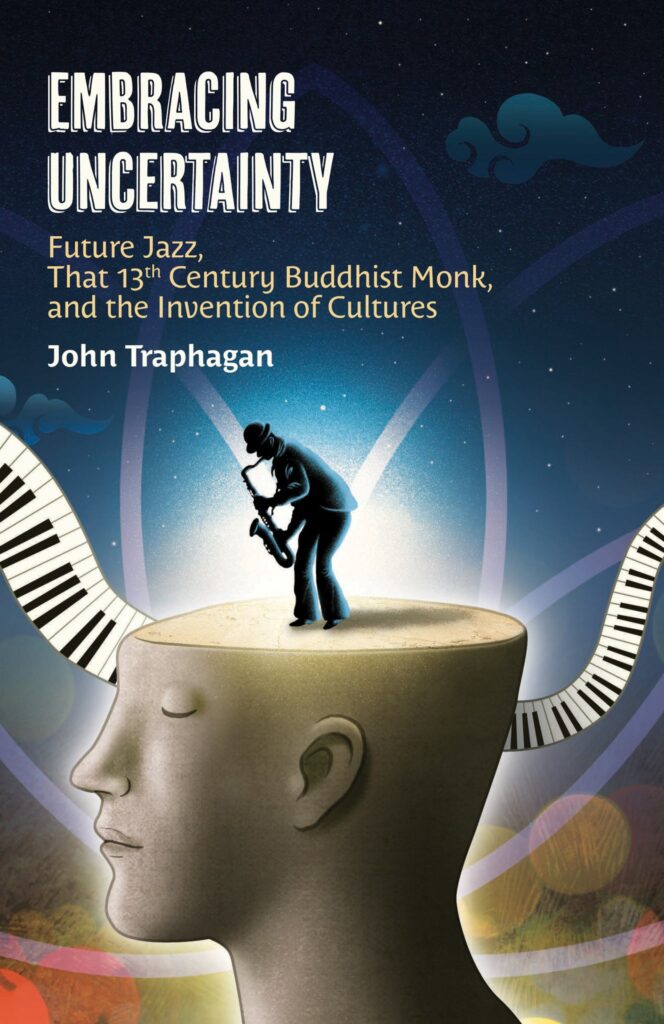The following are excerpts from an interview with Dr. John Traphagan, conducted by Religious Studies graduate student Frankie Summers in December 2021. In the interview, Dr. Trapagan discusses two of his recently published books: Embracing Uncertainty: Future Jazz, That 13th Century Buddhist Monk, and the Invention of Cultures and The Blood of Gutoku. For the full transcript, see the link below.

Frankie Summers:
Could you tell us a little bit about your process of integrating qualitative social science methods with creative writing for The Blood of Gutoku whose style could be considered experimental ethnography?
John Traphagan:
[P]art of the problem with a lot of ethnographic writing these days is that it’s heavily theory-laden. And that makes it difficult for intro undergraduates to read something ethnographic. They can read something old because that wasn’t all that theory-laden. But the newer stuff is very inaccessible to certainly first- and second-year undergraduates. So I wanted to write something that would do what ethnography does. It would describe a place in detail and describe people and try to bring you into their lives but do it in a way that’s more engaging.
[A]nyone who’s sat down and written ethnographic work, at some point you think in your head, “Am I just making shit up?” It’s just unavoidable, right? Because you’re picking and choosing what matters and then telling your audience this is what matters. And not telling them about all the stuff that you’ve decided doesn’t matter.
So I thought, well if I’m going to do that, then why don’t I just make this shit up? I decided alright I’ll write a novel. […] And you know, being an anthropologist is sort of like being a detective. You’re trying to understand what’s going on in another place, to understand patterns of behavior. You’re looking for clues that will teach you about why people do the things they do. And so I thought well alright I’ll write a murder mystery. I read a lot of them anyway. I like them. So I thought that would be a fun way to approach it.
And the goal was to try to write something—and maybe this will be its failing in the long run—but the goal was to write something that would be able to be used as an academic book in an undergraduate class but also would be appealing to a wider audience that just wants to know about Japan and wants to read a murder mystery. And that’s a very difficult line to walk on. It’s a tightrope, right?

Frankie Summers:
One of my favorite ideas in the book [Embracing Uncertainty] is that which you unpack from Watt’s quote: “A cat sits until it is done sitting, and then gets up, stretches, and walks away.” How have you incorporated Dogen’s call for care and quality and attention into your own work and life?
John Traphagan:
Well, I don’t plan much. You know, it’s interesting, so I talk about this in the book. I think short-term planning is of value. You kinda need to think about what you’re going to do today and that kind of thing. But I don’t set goals. I’ve never set goals. That’s pointless. There are too many things that come up along the way that might interrupt the goal and then you’re disappointed because you didn’t achieve the goal, but you might have wound up doing something far more interesting because you didn’t achieve that goal. So I’ve never really set goals of any kind.
[…]
If you’re sitting, focus on your sitting. If you’re reading, focus on your reading. You know, you’re terrible at this Frankie. You’re always thinking 85 years into the future. And that’s why you get anxious about it. But if you just stay focused on your exams or whatever it is, just do that. The next thing will fall into place after you finish that thing. And again, it doesn’t mean that you don’t plan at all because you have to have some idea. But I think what happens is people get wrapped up in the plan instead of what they’re doing. And the plan isn’t going to happen anyway. Things will change. They have to change, right? And so the plan itself isn’t going to happen. Some form of it might. But worrying too much about it, that just generates anxiety.
Click here to read the full interview.
Sarah Frankie Summers is a third-year PhD student in Religion and Society. Her ethnographic research explores music, ritual, and activism among Unitarian Universalists.
